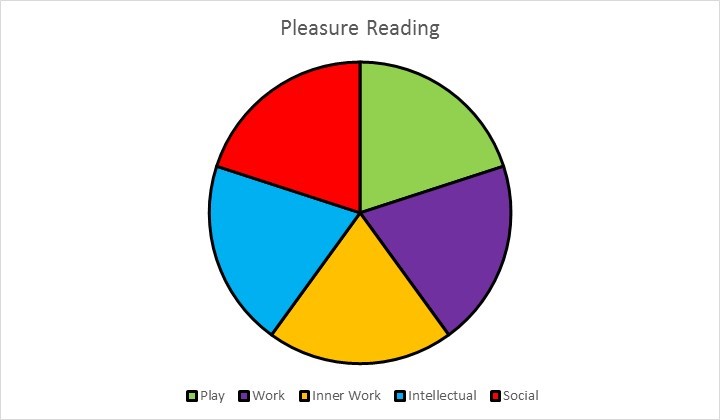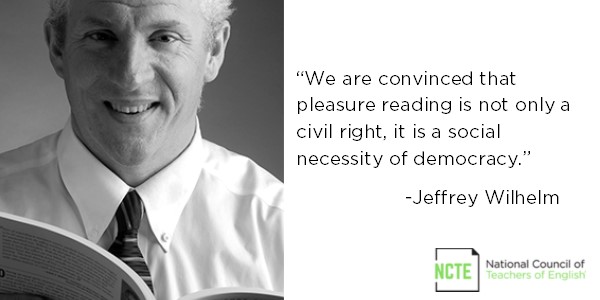This post is written by member Jeffrey Wilhelm.
Reading Unbound: Why Kids Need to Read What They Want and Why We Should Let Them was this past year’s winner of the NCTE David H. Russell Award for Distinguished Research in English Education.
The research findings that we report in Reading Unbound have profound implications for us as teachers, for our students, and for democracy.
In our book, we argue that pleasure reading is a civil rights issue. Why? Because fine-grained longitudinal studies (e.g., the British Cohort study: Sullivan & Brown, 2013; and John Guthrie’s analysis of PISA data, 2004, among many others) demonstrate that pleasure reading in youth is the most explanatory factor in both cognitive progress and social mobility over time.
Pleasure reading is more powerful than parents’ educational attainment or socioeconomic status. This means that pleasure reading is THE way to address social inequalities in terms of actualizing our students’ full potential and overcoming barriers to satisfying and successful lives.
We think that our data explain why pleasure reading leads to cognitive growth and social mobility.
The major takeaway for teachers is to focus on pleasure in our teaching. Pleasure has many forms: play pleasure/immersive pleasure, when you get lost in a book—this is a prerequisite pleasure and we can foster it in various ways, such as teaching with an inquiry approach, using drama and visualization strategies, etc.; work pleasure, where you get a functional and immediately applicable tool for doing something in your life; inner work pleasure, where you imaginatively rehearse for your life and consider what kind of person you want to be; intellectual pleasure, where you figure out what things mean and how texts were constructed to convey meanings and effects; and social pleasure, in which you relate to authors, characters, other readers, and yourself by staking your own identity. Kids (like all other human beings!) do what they find pleasurable. You get good at what you do and then outgrow yourself by developing new related interests and capacities.

Play pleasure develops the capacity to engage and immerse oneself, to visualize meanings and relate to characters. It is the desire to love and be loved. Work pleasure is the love of getting something functional done. Work pleasure is about the love of application and visible signs of accomplishment. Readers engaging in this pleasure cultivate transfer of strategies and insights to life. Inner work pleasure involves imaginatively rehearsing what kind of person one wants to be. As our informant Helen asserted: “It’s not really learning about yourself, it’s learning about what you could be . . . .” and “Characters are ways of thinking really . . . They are ways of being you can try on.”
Inner work is the love of transformation—of connecting to something greater, of striving to become something more. When our informants engaged in this pleasure, they expressed and developed a growth mindset and a sense of personal and social possibility.
Intellectual pleasure is pursued for the joy of figuring things out; it develops the capacity to see connections and solve problems. Our informants developed resilience, grit, and proactivity through the exercise of this pleasure. Erik Erikson argued that staking one’s identity is the primary task of early to late adolescence and that this is achieved through evolving interests and competence.
Social pleasure involves this human developmental project because it involves relating to authors, characters, other readers, and the self in ways that stake identity. Social pleasure is the love of connection—to the self, others, community, and to doing significant work together. This pleasure develops social imagination: the capacity to experience the world from other perspectives; to learn from and appreciate others distant from us in time, space, and experience; and the willingness to relate, reciprocate, attend to, and help others different from ourselves. In other words, it promotes cognitive progress, wisdom, wholeness, and the democratic project. In fact, all of the pleasures were found to do this.
Our data clearly establish that students gravitate to the kinds of books they need to navigate their current life challenges, and that many ancillary benefits accrue in the realms of cognition, psychology, emotional development, and socialness. So much so that we developed the mantra: Kids read what they need!
This finding led us to be more trusting of kids’ choices and to ask them about why they chose to read what they did, and eventually to championing these choices. We likewise found that each of the marginalized genres we studied (romance, horror, vampire, fantasy, and dystopia) provided specific benefits and helped students navigate different individual developmental challenges.
Our data also establish that young people are doing sophisticated intellectual work in their pleasure reading, much of it just the kind of work that the Common Core and other next generation standards call for. So making pleasure more central to our practice is not in conflict with working to achieve standards. Standards and all the other significant goals described here can be achieved if teachers value interpretive complexity as much as they do textual complexity, if they create inquiry contexts that reward entering a story world and doing psychological and social work in addition to more traditional academic goals, and if they provide opportunities for choice and meaningful conversation.
Given the benefits of each pleasure, we are convinced that pleasure reading is not only a civil right, it is a social necessity of democracy.
That is why we urge you to promote pleasure reading in your classroom and school, and it is why our book is filled with practical ideas for how to do so while promoting each of the five pleasures. It is monumental work—and it is work we must undertake with the greatest urgency—particularly at this moment in history.
Works Cited
Erikson, E. H. (1968). Identity: Youth and crisis. New York: Norton.
Guthrie, J. T., Schafer, W. D., & Huang, C. W. (2001). Benefits of opportunity to read and balanced instruction on the NAEP. Journal of Educational Research, 94, 145-162.
Kirsch, I., de Jong, J., LaFontaine, D., McQueen, J., Mendelovits, J., & Monseur, C. (2002). Reading for change: Performance and engagement across countries: Results from PISA 2000. Paris, France: Organisation for Economic Co-operation and Development. Retrieved May 29, 2015 from http://www.oecd.org/edu/school/programmeforinternationalstudentassessmentpisa/33690904.pdf
Sullivan, A. & Brown, M. (2013). Social inequalities in cognitive scores at age 16: The role of reading. London: Centre for Longitudinal Studies.
Wilhelm, J. and Smith, M.W. (2014). Reading Unbound: Why kids need to read what they want and why we should let them. New York: Scholastic.
Jeffrey D. Wilhelm is Distinguished Professor of English Education at Boise State University who teaches and co-teaches middle and high school classes each year. He is the author or co-author of 37 books about literacy teaching, the winner of the NCTE Promising Research Award, and two-time recipient of the David H. Russell Award for Distinguished Research in English Education

